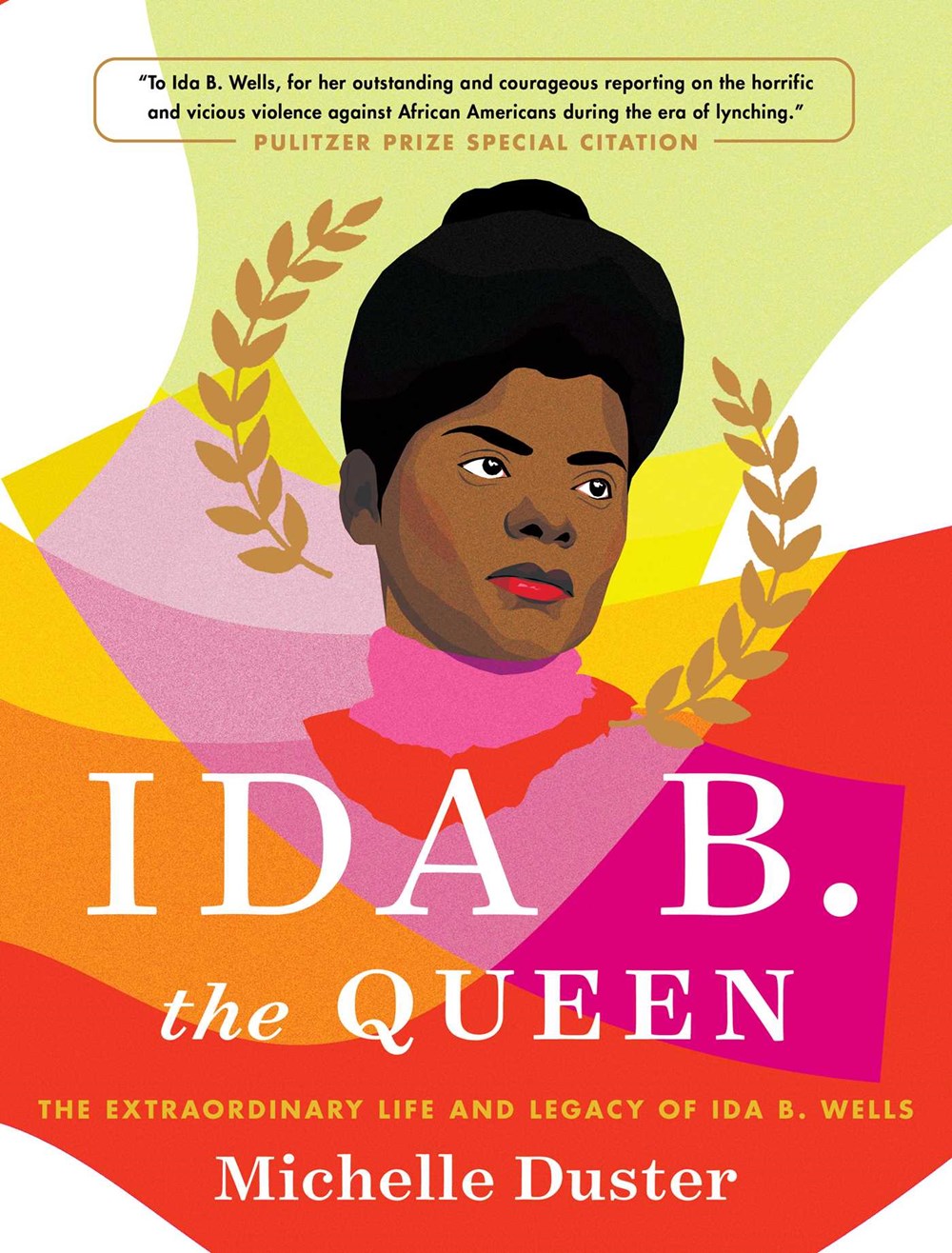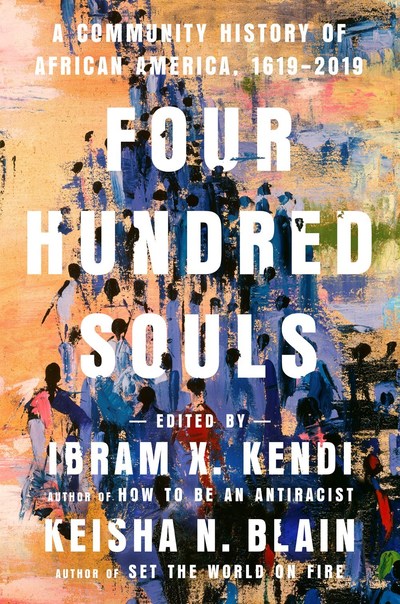Our national conversation about anti-Black racism made 2020 a pivotal year—painful for many, cathartic for others, memorable to all. Now a new year brings new opportunities to listen to Black voices and stories. Pick up one of these titles to deepen your knowledge of our country’s past, and join the chorus of voices advocating for a better future.
Ida B. the Queen
 Ida B. Wells gets the royal treatment in Ida B. the Queen: The Extraordinary Life and Legacy of Ida B. Wells, written by Michelle Duster, Wells’ great-granddaughter.
Ida B. Wells gets the royal treatment in Ida B. the Queen: The Extraordinary Life and Legacy of Ida B. Wells, written by Michelle Duster, Wells’ great-granddaughter.
From the 1890s through the early 20th century, Wells was a pioneering activist and journalist who fought racism by publicizing heinous acts of violence toward Black Americans during the Jim Crow era. Crafted with empathy for and intimate knowledge of this American icon, the book recounts Wells’ many groundbreaking achievements, which caused the FBI to dub her a “dangerous negro agitator” in her time. Unlike in a typical biography, however, Duster integrates her own perspective of her great-grandmother into this narrative, inspecting her family’s legacy along the way. Duster also outlines the cultural impact Wells had on her contemporaries, such as W.E.B. Du Bois, and draws a throughline from Wells’ defiant voice at the turn of the 20th century to the struggle for Black lives today.
In addition to its compelling content, this book is also drop-dead gorgeous. Vibrant illustrations of Wells and other important history makers, such as Josephine St. Pierre Ruffin, Malcolm X and Bree Newsome, add even more color to their colorful lives. Wells was righteously indignant and wise beyond her era, and Duster translates her drive to today’s racial discourse with insight and grace.
★ Four Hundred Souls
 If you’re looking for a single work that spans the entirety of the Black experience in America, pick up a copy of Four Hundred Souls: A Community History of African America, 1619–2019, edited by Ibram X. Kendi and Keisha N. Blain. This comprehensive meditation on Black history in the United States features 90 noteworthy Black authors and poets ruminating on the last 400 years—beginning with the date of the first recorded arrival of enslaved people from Africa on these shores.
If you’re looking for a single work that spans the entirety of the Black experience in America, pick up a copy of Four Hundred Souls: A Community History of African America, 1619–2019, edited by Ibram X. Kendi and Keisha N. Blain. This comprehensive meditation on Black history in the United States features 90 noteworthy Black authors and poets ruminating on the last 400 years—beginning with the date of the first recorded arrival of enslaved people from Africa on these shores.
Each author reflects on five years in America, focusing on a different “person, place, thing, idea, or event”—such as Phillis Wheatley, Oregon, cotton, queer sexuality and the war on drugs. At the end of each 40-year section, a poet captures that historical period in verse. With contributions from huge names in the community of Black thought leaders, such as Nikole Hannah-Jones, Isabel Wilkerson, Angela Davis and Jamelle Bouie, just to name a few, the scope of the writing is immense and powerful, the content both celebratory and harrowing.
You may feel drawn to this book because of its heavy-hitting roster of big names, but look forward to widening your familiarity with more up-and-coming writers, too. With so many authors and topics represented in these pages, you’re sure to gain new insight about every tumultuous period in our nation’s history.
ALSO IN BOOKPAGE: Four Hundred Souls is the year’s most astounding full-cast audiobook production. Go behind the scenes with Kendi, Blain and the producers.
Julian Bond’s Time to Teach
 One valuable yet often overlooked leader in the fight for Black equality is finally getting his due in Julian Bond’s Time to Teach: A History of the Southern Civil Rights Movement. The late author’s lectures from his prolific teaching career, assembled here for the first time, are full of firsthand lessons from his direct involvement in the civil rights movement.
One valuable yet often overlooked leader in the fight for Black equality is finally getting his due in Julian Bond’s Time to Teach: A History of the Southern Civil Rights Movement. The late author’s lectures from his prolific teaching career, assembled here for the first time, are full of firsthand lessons from his direct involvement in the civil rights movement.
As one of the founding members of the Student Nonviolent Coordinating Committee (SNCC), Bond participated in myriad sit-ins and protests in the Southern United States and even worked directly with Martin Luther King Jr. Later he became an elected member of both the Georgia House of Representatives and the Georgia Senate and then began teaching at institutions such as Harvard, the University of Virginia and American University. As a lifelong activist, Bond not only protested for Black civil rights but was also an early advocate for LGBTQ rights and rights for disabled people, long before any legislation, courts or popular thought addressed these needs.
Reflecting his storied life of activism, Bond’s lectures offer a road map of the history of the United States and white supremacy, covering the formation of the NAACP, the treatment of Black soldiers through World War II, the landmark Brown v. Board of Education case and other milestones. Along the way, he meticulously details the daily efforts to build and expand the Southern civil rights movement throughout the 20th century, highlighting the contributions of many underrecognized individuals.
During his life, Bond wanted to educate the world about the history of the Black experience, as well as about the nuts and bolts of starting and maintaining a protest movement. With this posthumous collection, and with the help of the editors who assembled it, he can finally share his teachings with the broad audience he deserves.
★ A Shot in the Moonlight
 Imagine being woken up in the middle of the night by a mob outside your house, calling your name, accusing you of crimes that you didn’t commit. Then imagine that they start throwing explosives and firing guns at your house, at your family. You defend yourself and your home as best you can, and one of the assailants dies from the intervening fight. Suddenly you find yourself, a Black man, a formerly enslaved person, fleeing through 1890s Kentucky, trying to stay out of the hands of lynch mobs. With the Ku Klux Klan and newspapers calling for your execution, you’re forced to put your life in the hands of a lawyer who fought to uphold slavery.
Imagine being woken up in the middle of the night by a mob outside your house, calling your name, accusing you of crimes that you didn’t commit. Then imagine that they start throwing explosives and firing guns at your house, at your family. You defend yourself and your home as best you can, and one of the assailants dies from the intervening fight. Suddenly you find yourself, a Black man, a formerly enslaved person, fleeing through 1890s Kentucky, trying to stay out of the hands of lynch mobs. With the Ku Klux Klan and newspapers calling for your execution, you’re forced to put your life in the hands of a lawyer who fought to uphold slavery.
This complicated tale is masterfully told in Ben Montgomery’s A Shot in the Moonlight: How a Freed Slave and a Confederate Soldier Fought for Justice in the Jim Crow South. Montgomery, the Tampa Bay Times journalist who covered the Dozier School for Boys (which would later inspire Colson Whitehead’s novel The Nickel Boys), guides us through the events that took place on the night of January 21, 1897, at the home of George Dining.
A Shot in the Moonlight reads like a riveting thriller, with multiple moving pieces and conflicting perspectives, but historical artifacts such as newspaper excerpts and first-person accounts also give it journalistic depth. Set during an era when being Black and accused of a crime was almost a guaranteed death sentence, this gripping history offers hope through the actions of an unlikely cast of characters who sought to save a man from a cruel and vindictive fate.
Soul City
 If you’re looking for something lower octane that still offers an intriguing exploration of what could have been, take a trip to Soul City: Race, Equality, and the Lost Dream of an American Utopia. Author Thomas Healy tells the story of Soul City, North Carolina, an intentional community founded in the 1970s by the Black lawyer Floyd McKissick, aimed at helping Black people achieve the American dream. While not an exclusively Black community, Soul City was intended to be a place for Black people to grow, prosper economically and exercise their hard-won civil rights outside of segregated cities.
If you’re looking for something lower octane that still offers an intriguing exploration of what could have been, take a trip to Soul City: Race, Equality, and the Lost Dream of an American Utopia. Author Thomas Healy tells the story of Soul City, North Carolina, an intentional community founded in the 1970s by the Black lawyer Floyd McKissick, aimed at helping Black people achieve the American dream. While not an exclusively Black community, Soul City was intended to be a place for Black people to grow, prosper economically and exercise their hard-won civil rights outside of segregated cities.
Envisioning a city whose main streets were named after the likes of Nat Turner, John Brown and Dred Scott, McKissick lobbied for help from the federal government to pursue his municipal dream, and surprisingly, the Nixon administration eventually granted him the seed money. However, despite years of effort, the town is now little more than a blip on the historical radar. And by some dark irony, Soul City’s largest industry today is the operation of a for-profit prison.
So what happened? Was Soul City doomed from the beginning, like so many ambitious utopian experiments? As Healy shows, it’s not that simple. Soul City’s bumpy background is littered with statewide backlash, legislative resistance and financial undercutting, which prevented the project from flourishing. This chronicle of what went wrong, and who wanted it to go wrong, outlines both missteps by the city’s planners as well as outside obstacles that contributed to the experiment’s failure. Even so, McKissick’s shining vision for Soul City will inspire readers to dream of what kinds of communities we could create next.
The Black Panther Party
 For education that’s easy on the eyes, snag The Black Panther Party: A Graphic Novel History by David F. Walker (The Life of Frederick Douglass). Beautifully illustrated by Marcus Kwame Anderson and supremely informative, this graphic novel offers a digestible history of the Black Power movement and the Black Panther Party, correcting many negative assumptions about them while still addressing their flaws.
For education that’s easy on the eyes, snag The Black Panther Party: A Graphic Novel History by David F. Walker (The Life of Frederick Douglass). Beautifully illustrated by Marcus Kwame Anderson and supremely informative, this graphic novel offers a digestible history of the Black Power movement and the Black Panther Party, correcting many negative assumptions about them while still addressing their flaws.
The book especially excels in illuminating the motives of the party’s founders, Bobby Seale and Huey P. Newton. Their original aims were to improve community security, defy the tactics of racist police departments, provide free community breakfast and offer support to underserved youth. However, the party’s faulty decision-making, along with efforts by police institutions and the FBI to sabotage the party every step of the way, led to its ultimate unraveling.
A breeze to read and a feast for the eyes (and mind), this book is perfect for every burgeoning revolutionary.












